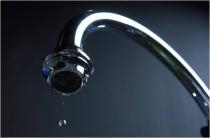Wading through water-test results subject of webinar
http://live.psu.edu/story/48230/nw69
Friday, September 3, 2010
Wading through water-test results subject of webinar

Well owners may wish to have drinking water tested before and after nearby gas wells are drilled.
When it comes to water-test results, one of the murkiest problems facing homeowners is how to interpret the results, according to an expert in Penn State’s College of Agricultural Sciences. And with the flood of Marcellus shale gas-drilling activity in Pennsylvania, there has been a steadily rising tide of information about water availability, water quality, water-testing procedures and what those tests indicate.
“We’re finding that in a lot of these counties, there is a lot of water testing being done by gas companies or by households — before and after drilling — and these water test reports can be very hard to understand,” said Bryan Swistock, a water resources extension specialist in the college’s School of Forest Resources. “For some, it’s like trying to decipher foreign language.”
To help owners of private water supplies navigate the water-testing maze, Swistock will conduct a free Web-based seminar titled, “How to Interpret Pre- and Post-Gas Drilling Water Test Reports.” Part of a series of online water-related workshops produced by Penn State Cooperative Extension, the webinar will air at noon and again at 7 p.m. Wednesday, Sept. 15.
Participants must pre-register for the webinars, but only one registration is required for the entire series. To register, visit http://extension.psu.edu/water/webinar-series. Once participants have pre-registered, they may visit the webinar site (https://breeze.psu.edu/water1) on the day of the presentation to view the live presentation.
Water-quality experts, gas-company officials and attorneys all agree that if gas-drilling activity is scheduled to take place nearby, homeowners should get pre-drill water testing done, Swistock said. Because gas companies have a presumed responsibility for water quality within 1,000 feet of a gas well, they frequently provide free water testing to homeowners within that radius. Some gas companies may pay to test private water systems even beyond 1,000 feet from a gas well, he added.
Homeowners who live outside that range — or ones who don’t trust free testing — may opt to pay for their own testing. For these consumers, Swistock advises hiring a state-accredited lab to come out to the home. The water sample then becomes a “legally valid” sample, the chain of custody of which is assured, should a case go to court, he said.
Swistock explained that water testing for all possible pollutants associated with gas-well drilling can by very expensive. Homeowners should discuss the costs of the testing with the laboratory or consultant to select a testing package that addresses their concerns while still being affordable.
Some homeowners are distressed to discover pre-existing problems that have nothing to do with gas exploration. It is common to uncover problems such as bacteria, traces of nitrate, or lead, which sometimes can come from the home’s own plumbing system. “Some problems don’t have symptoms, so if the well was never tested previously, and people didn’t experience any symptoms, they’ll think the test result was doctored,” Swistock said.
He noted that more than 1 million Pennsylvania homes and farms have drilled water wells, and about 45 percent of them have never been tested. He said bacteria occurs in about one-third of water wells in the state and is likely to go undetected unless someone had reason to investigate.
Changes in other water conditions may prompt more immediate investigation. Nearby construction or drilling may create changes in water’s appearance, taste or availability. The sudden onset of spurting faucets, foaming or cloudy water, metallic or salty tastes, previously undetected odors, or reduced flow volume may each indicate manmade problems caused by localized disturbances.
In addition to water sources, information also should be carefully evaluated. With the recent deluge of sources disseminating information related to protecting water supplies near gas drilling, Swistock suggests that homeowners with private water systems in the Marcellus region be vigilant and carefully weigh comments and recommendations they receive. He recommends seeking out credible sources of information, trustworthy third-party testing services and state-accredited water labs to conduct the testing.
“It’s our mission to provide unbiased information grounded in research to help people manage and protect the water resources of Pennsylvania,” Swistock said. “None of my current or past research funding has come from the Marcellus gas industry. My only goal is to provide facts that will help homeowners and others make the best decision possible.”
The webinar also will provide viewers with links to useful websites, including a description of various water tests, a list of state-accredited labs and an online Drinking Water Interpretation Tool to help homeowners interpret complex water test reports.
This presentation is part of an overall series targeting the most common water questions and concerns people have about water resources on their own property, whether those are water wells, septic systems or ponds. Other topics in the series include managing septic systems, ponds and lakes, drilling wells and safe drinking water. Recordings of previous webinars can be found at http://extension.psu.edu/water/webinar-series.
